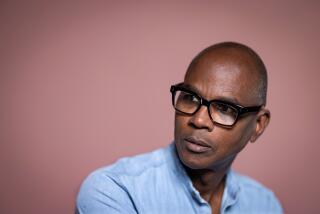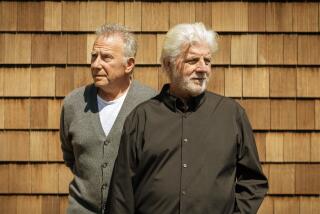POET FORD TAKES JAZZ AT ITS WORD
Jazz got into poet Michael C. Fordâs blood at an early age and itâs been flowing there ever since.
The 43-year-old Chicago native recalls listening to singer June Christy on the radio at age 9, and standing outside Zardiâs at 12, hearing âbrass waterfallsâ soar from the band of Stan Kenton, âwhose ghost is still one of my heroes.â
But it was experiences at 15 that started Ford on a lifelong romance with words and music. A man named Jack Hampton began presenting jazz at the Crenshaw Theatre on Crenshaw Boulevard, where Ford used to see such films as âBetween Midnight and Dawnâ and âGun Crazy.â
Sometimes there would be poets on the bill as well. Ford heard writers such as Kenneth Patchen, Kenneth Rexroth and Ken Nordine reading their poetry, accompanied by such musicians as Shorty Rogers, Art Pepper and Teddy Edwards. He was immediately inspired.
âPatchen came down from San Francisco, along with Allyn Fergusonâs Chamber Jazz Sextet,â Ford recalled in his West L.A. apartment that he dubbed âan alchemistâs cave where quality lead is turned into foolâs gold.â âFergusonâs charts were designed for Patchenâs poetry. The band started, then Patchen walked out in a red tux coat, sat down on a bar stool with his work on a music stand and just cooked . It was unbelievable. I realized that was what I wanted to do.â
Ford, who was first influenced by poets like Dylan Thomas, started writing as a teen-ager and was first published in Germany in 1962. But he didnât stick with it, and didnât write much between 1963-69. Instead, he played bass with jazz-influenced rockers like pianist Ray Manzarek (the Doors) and drummer Ed Cassidy (Spirit) and traveled. He also âschlepped sceneryâ for John Housemanâs Theatre Group at UCLA Extension, a job he got through Oscar-winning actor F. Murray Abraham, and where he met poet/musician Jim Morrison.
After his debut reading with Morrison and Michael McClure at the Cinematique 16 Theatre on the Sunset Strip in 1969, Ford began writing with a passion. Since 1970, heâs published at least one volume a year--from large, fold-out âbroadsidesâ to small, staple-bound âchapbooks.â Heâs also conducted numerous teaching seminars and workshops in Colorado, Utah, Nevada and California. For the past five years, he has been San Joaquin County coordinator of California Poets-in-the-schools, a seminar-for-teachers program under the auspices of the Humanities Department at San Francisco State University. Here he gives teachers ideas on how to help students âfind new ways that will allow them to find some avenue of (written) self-expression.â
Despite his jazz roots, Ford doesnât consider himself a jazz poet. âIâm glad Iâm not (that limited),â he said. âI tend to go for something more inside. Everything I write comes through a very complicated, multi-layered funnel of the poetic imagination.â
Some of Fordâs poems center on jazz personalities like Art Pepper, Charles Mingus, Thelonious Monk and Bobby Troup. Others, such âVirgin River Gorge,â which alludes to the sound of five trombones in describing a riverâs roar, reveal that the writerâs musical experiences from the late â50s-early â60s are freely scattered throughout his work.
âYes, I use that music as part of my image life,â he said. âThereâs a whole era of piano bars and jazz clubs thatâs got to be remembered, and people are too willing to say goodby to it.â
He reads his poetry tonight ()at McCabeâs in a reunion with McClure, and Sunday at the Lhasa Club, where heâll work in between screenings of âThe Jazz Tapes,â which features greats Billie Holiday, Miles Davis, Lester Young and Count Basie. Ford has also just released a debut spoken word LP, âLanguage Commandoâ (Freeway Records), which he describes as âa cross section of pop culture images with some of the past tense.â
In addition to his poems, Fordâs also written several one-act plays, one of which, âGoddess Latitudes,â was shown locally on KCET in 1981, and has edited several poetry publications.
Though he says poetry is hardly a superstar occupation, he does manage to make a living at it. But the material world is not his reference point for success. âSuccess to me is putting a piece of paper in this old beauty,â he said, patting a vintage typewriter, âand after a few hours, being able to roll something out that makes some kind of sense.â
More to Read
The biggest entertainment stories
Get our big stories about Hollywood, film, television, music, arts, culture and more right in your inbox as soon as they publish.
You may occasionally receive promotional content from the Los Angeles Times.










